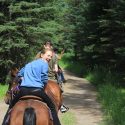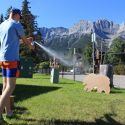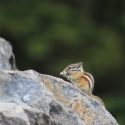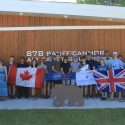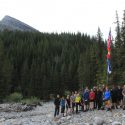In July and August 2019, fourteen cadets and six staff from across Wales and the South West, embarked on the trip of a lifetime in Banff National Park, Canada. We set out with the aim of completing a six-day unsupported expedition, as well as experiencing the best that the Rockies had to offer in terms of adventure training opportunities and cultural visits. In the lead up to the expedition, numerous training weekends were held and lots of planning and fundraising was done to ensure we gained the most in experience and skills from the trip. The hope was not only to provide us with new skills and to have an enjoyable time, but also to develop us as people and leaders. This was made possible on this unique trip by the staff giving us the independence and freedom to organise the trip as a team of cadets, with minimal involvement regarding decisions from our staff members.
An especially unique aspect of the trip was that as cadets, we were entirely responsible for the planning of all the activities and excursions on the trip. While the staff contributed ideas from their own personal experiences in the area, it felt as if we, the cadets, were in control of the different things we did while in Canada. This meant extensive online research, as well as liaising with local Canadian Air Cadets for recommendations and support. We were also in charge of planning the food for both ourselves and the staff on the trip. This not only involved cooking, but also buying the food at local supermarkets while working within the group budget. Finally, we were also responsible for the expedition route planning: we were given only a start point and an end point. It was then up to us to decide which route we wanted to take and where we wanted to camp, as well as to adjust the route as necessary whilst on the expedition.
This ‘cadets in control’ theme brought quite a few challenges that we had to overcome as a team. This is where the day leader would have to take control and make a final decision. Each day a cadet was selected to act as ‘day leader’. This involved deciding when to wake up and leave for activities as well as organising transport and keeping an eye on general timings throughout the day. Each of us had to discover that as day leader, we each had to be decisive in our leadership, while at the same time communicating effectively with our team to ensure the smooth running of the day. While this new outlook on the way cadet trips are run took a while to get used to, it was an excellent development opportunity to be on an Air Cadet camp where you weren’t simply given an itinerary and just had to get on with it. If, as a group, we decided we didn’t want to do something and we came up with a suitable alternative, then it was no trouble at all to simply change the plan for that day to suit our needs. This flexibility, without a doubt, made the trip a lot more enjoyable. It has also given us valuable leadership skills to take back to our home units, developing us as future staff members in the Air Cadets.
In preparation for the trip, we needed to raise the funds to allow us to do as wide a range of activities in country as possible. In addition to the support given by the Ulysses Trust, we undertook numerous fundraising activities, the first if which was a day of Christmas Tree Packing at Frenchay Forestry. For many of us this was the first time we’d met one another, so it doubled as a good team bonding exercise. The team naturally gelled as we worked together to complete a variety of tasks such as displaying and selling the trees and helping customers carry the trees to their cars. The day wasn’t without its difficulties though, which came in the form of an especially large tree that required some creative thinking and a bit of elbow grease to get through the packing machine. This was an early indication of the persistence, teamwork and creativity that Exercise Mountain Storm would require from us all.
Our trip would not have been possible with the aid of our fellow Canadian Air Cadets in Canmore. They facilitated our adventure with unlimited access to their squadron and the lending of gear, such as the tents, stoves and ration packs which were all used on our expedition. Once back in Canmore, we had several opportunities to meet our new friends. They hosted a glorious, meaty barbeque where we met and compared experiences with the Squadron staff and several of the older cadets. After we said our thanks, we had plenty of questions regarding the differences and similarities between our squadrons in the UK and Canada. We discussed everything from ranks and classifications, to flying and camps. Being able to talk to the Canadian cadets and learn about the very different, but exciting, life they lived in Canada was definitely a highlight of the trip, and gave us a real insight into their life experiences.
On the recommendation of the Canadian cadets, we visited a local museum to learn about the history of the National Parks in Canada. This was a very interesting and informative day out and gave us a newfound perspective on the scenery that we had travelled through on our expedition, and how it was protected.
As much as we had great fun in Canada, it didn’t come without its challenges, both physical and mental. This was most apparent during the expedition phase of the trip, where its arduous nature and many unforeseen problems forced us to come together to help the team push through. Along the way, we experienced difficult terrain, dehydration and broken kit – but all these problems only helped us to work more effectively as a team. Many team members struggled with the heat and heavy packs, however, others were always quick to provide encouragement and where necessary, share the load. One notable challenge came when we encountered an imposing gorge with supposedly impassable boulders and waterfalls. Instead of allowing this to dampen our spirits, we instead set to work building bridges, climbing waterfalls and forming human chains to get our kit through the gorge. By the end of the expedition we knew the whole team’s strengths and weaknesses, allowing us to better watch out for one another and move quickly as a team.
Sgt Lloyd summarises the development experience of us all:
“After Canada I am more willing to go out of my comfort zone and push myself further. I’ve developed my leadership and problem-solving skills to help tackle problems that catch me off guard. Personally, I think that my organisation skills have improved the most as being in charge of nineteen other people (including the staff) requires a lot of planning and being organised is key to making that day run smoothly.”
All in all, the trip was better than we could ever have expected. Not only did we gain life skills and experiences in a way that trumps any conventional cadet camp, but we did so whilst meeting some incredible people, and going on a proper good old-fashioned adventure in the most beautiful country on earth.
The Ulysses Trust also wish to thank the generosity of the Royal Air Force Charitable Trust for supporting this expedition. www.rafct.com

